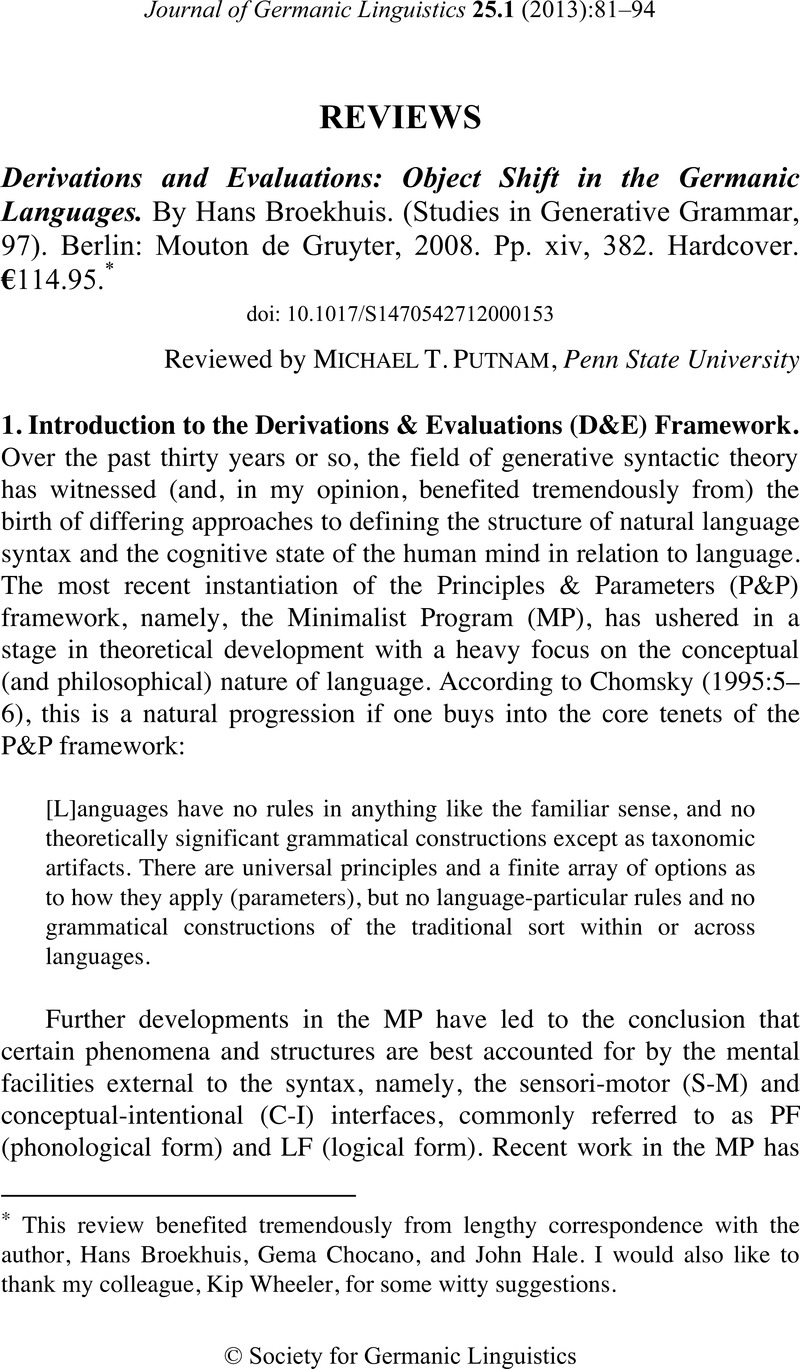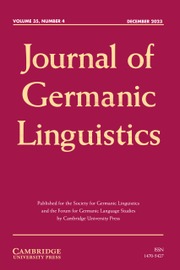No CrossRef data available.
Article contents
REVIEWS - Derivations and Evaluations: Object Shift in the Germanic Languages.. By Hans Broekhuis. (Studies in Generative Grammar, 97). Berlin: Mouton de Gruyter. 2008. Pp. xiv, 382. Hardcover. €114.95.*
Published online by Cambridge University Press: 19 February 2013
Abstract
An abstract is not available for this content so a preview has been provided. Please use the Get access link above for information on how to access this content.

- Type
- Reviews
- Information
- Copyright
- Copyright © Society for Germanic Linguistics 2013
References
REFERENCES
Bresnan, Joan. 1996. LFG in an OT Setting: Modeling Competition and Economy. Proceedings of the First LFG Conference. Stanford, California, CSLI Publications. http://csli-publications.stanford.edu/ (November 19, 2012).Google Scholar
Bresnan, Joan. 2000. Optimal syntax. Optimality theory: Phonology, syntax and acquisition, ed. by Dekkers, Joost, van der Leeuw, Frank, & van de Weijer, Jeroen, 334–385. Oxford: Oxford University Press.CrossRefGoogle Scholar
Bresnan, Joan. 2001. The emergence of the unmarked pronoun. Optimality-theoretic syntax, ed. by Legendre, Géraldine, Grimshaw, Jane, & Vikner, Sten, 113–142. Cambridge, MA: MIT Press.CrossRefGoogle Scholar
Broekhuis, Hans, & Wim, Klooster. 2001. On merge and move/attract. Progress in grammar. Articles at the 20th anniversary of the Comparison of Grammatical Models Group in Tilburg, ed. by van Oostendop, Marc and Anagnostopoulou, Elena. http://www.meertens.knaw.nl/books/progressinggrammar (November 19, 2012).Google Scholar
Chomsky, Noam. 2000. Minimalist inquiries: The framework. Step by step: Essays on minimalist syntax in honor of Howard Lasnik, ed. by Martin, Roger, Michaels, David, & Uriagereka, Juan, 89–155. Cambridge, MA: MIT Press.Google Scholar
Chomsky, Noam. 2001. Derivation by phase. Ken Hale. A life in language, ed. by Kenstowicz, Michael, 1–52. Cambridge, MA: MIT Press.Google Scholar
Chomsky, Noam, & Howard, Lasnik. 1977. Filters and control. Linguistic Inquiry 8. 425–504.Google Scholar
Dekkers, Joost. 1999. Derivations and evaluations. On the syntax of subjects and complementizers. Amsterdam: University of Amsterdam/HIL dissertation.Google Scholar
Déprez, Viviane. 1989. On the typology of syntactic positions and the nature of chains: Move-alpha to the specifier of functional projections. Cambridge, MA: MIT dissertation.Google Scholar
Frampton, John, & Sam, Gutmann. 2002. Crash-proof syntax. Derivations and explanations in the minimalist program, ed. by Epstein, Samuel D. & Seely, T. Daniel, 90–105. Malden, MA/Oxford: Blackwell Publishing.CrossRefGoogle Scholar
Grimshaw, Jane. 1997. Projection, heads, and optimality. Linguistic Inquiry 28. 373–422.Google Scholar
Mahajan, Anoop. 1990. The A/A-bar distinction and movement theory. Cambridge, MA: MIT dissertation.Google Scholar
Pesetsky, David. 1997. Optimality theory and syntax: Movement and pronunciation. Optimality theory, ed. by Archangeli, Diana & Langendoen, Terry, 134–170. Malden, MA/Oxford: Blackwell.Google Scholar
Pesetsky, David. 1998. Some optimality principles of sentence pronunciation. Is the best good enough? ed. by Barbosa, Pilar, Fox, Daniel, Hagstrom, Paul, McGinnis, Martha, & Pesetsky, Dadic, 337–383. Cambridge, MA: MIT Press.Google Scholar
Sappir, Michael. 2011. The possessor dative construction in Modern Hebrew: Movement as repel-based extremely local optimalization. Leipzig: University of Leipzig BA thesis.Google Scholar
Stroik, Thomas S. 2009. Locality in minimalist syntax. Cambridge, MA: MIT Press.CrossRefGoogle Scholar
Svenonius, Peter. 2000. Quantifier movement in Icelandic. The derivation of VO and OV, ed. by Svenonius, P., 255–292. Amsterdam: John Benjamins.CrossRefGoogle Scholar
Vogel, Ralf. 2004. Remarks on the architecture of OT-syntax grammars. Optimality theory and pragmatics, ed. by Blutner, Reinhard & Zeevat, Henk, 211–227. Houndmills: Palgrave MacMillan.CrossRefGoogle Scholar
Webelhuth, Gert. 1989. Syntactic saturation phenomena and the modern Germanic languages. Amherst, MA: University of Massachusetts-Amherst dissertation.Google Scholar
Webelhuth, Gert. 1992. Principles and parameters of syntactic saturation. New York, NY: Oxford University Press.CrossRefGoogle Scholar
Zwart, Jan-Wouter. 1997. Morphosyntax of verb movement: A minimalist approach to the syntax of Dutch. Dordrecht: Kluwer.CrossRefGoogle Scholar




